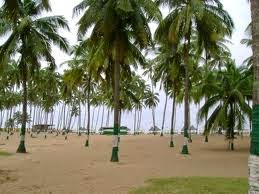Lagos is the largest city in Nigeria and former capital city of Nigeria. It is located at 6°34′60″N, 3°19′59″E. Lagos was the capital of Nigeria from 1914 – 1976 and lost its status to Abuja on December 12, 1991.
The city is the commercial and industrial hub of Nigeria, with a GNP that triples that of any other West African country. It has greatly benefited from Nigeria's natural resources in oil, natural gas, coal, fuel wood and water.
Lagos comprises several islands such as Victoria Island, Ikoyi and Isale-Eko. It harbors Nigeria's leading port, the Port of Lagos, which is split into three main sections: Lagos port, Apapa Port and Tin Can Port, all located on the Gulf of Guinea and run by the Nigerian Port Authority.
More than half of Nigeria's industrial capacity is located in Lagos's mainland suburbs, particularly in the Ikeja industrial estate. A wide range of manufactured goods are produced in the city, including machinery, motor vehicles, electronic equipment, chemicals, beer, processed food and textiles.
There are too many tourist attractions in Lagos – from the Island, Mainland, Epe, from the longest of three bridges connecting Lagos Island to the mainland, there are nice beaches around Victoria Island that you can have fun all year round. Example Eleko beach, lekki conversation beach and a whole lot more. Here are pictures of some fun places
References
http://en.wikipedia.org/wiki/History_of_Lagos
www.questia.com/library/encyclopedia/101254213 











0 comments: